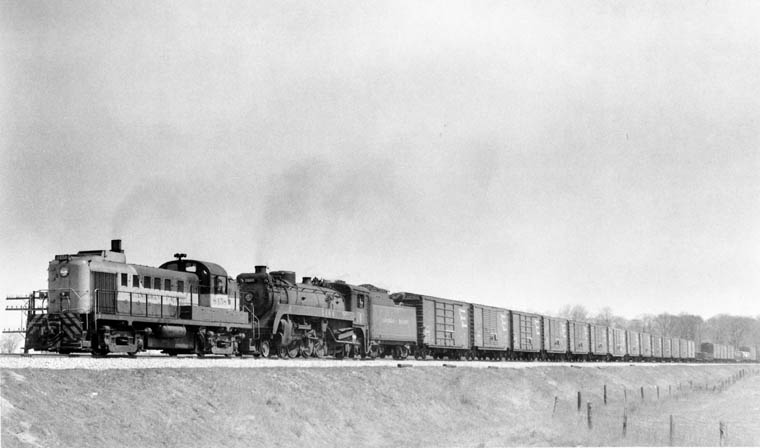
Time
freight No. 953 is seen just south of Bolton, on the Mactier Subdivision, on July
3, 1956. The combination of diesel and steam, and vice-versa, could be seen quite
frequently in the assist areas around Toronto at this time. No. 8458 would cut
off at Bolton, returning light to Toronto, while No. 2464 continued through to
Cartier. Operating from Toronto through to Calgary, No. 953 connected at Winnipeg
with No. 977, bound for Edmonton.
The first 13 cars in the consist are
from the 294000 series, used for carrying automobiles and equipped with Evans
Loaders. These suspended the automobiles on racks near the roof creating a second
deck and a white stripe painted on the side doors indicated that the cars carried
this equipment. In addition, these cars had wide end doors on the A end for loading
vehicles. They were reduced to box-car status with the introduction of multi-level
carriers, and the subsequent removal of the Evans Loaders.
This particular
stretch of line, from Toronto to Bolton, was built between 1869 and 1871, as the
narrow gauge Toronto, Grey and Bruce Railway. It turned northwest from Bolton,
cutting across country, through the rugged Caledon Hills, with sharp curves and
grades over 2%, to Orangeville and Owen Sound. Eventually rebuilt to standard
gauge, it passed into the hands of the CPR in 1883. In 1907, the line was extended
northwards from Bolton Junction to Bala, and then on to Romford Junction, where
it met the transcontinental main line in 1908. The track from Bolton to Melville
Junction, just south of Orangeville, was taken up to May 1933, as it proved too
expensive to operate. Owen Sound passenger trains, running from Toronto via Bolton,
were rerouted over the Windsor main line to Streetsville Junction, and north to
Orangeville.
No. 8458 belonged to Canadian Pacific's DRS-16b class and
was built by MLW in 1954, to the design of the Alco RS-3. Assigned to the Quebec
District, Smiths Falls Division, she operated between St. Luc and Lambton at the
time this photograph was taken, but it can be seen that these locomotives were
not always restricted to their own territory and would stray to other areas. This
class of engine was fitted with steam style illuminated number boards and marker
lights, which gave a transitional look. Involved in a fire at Sudbury on February
19,1975, No. 8458 was tied up unserviceable at Angus on March 17,1975, retired
two weeks later, and scrapped in April of that year.
No. 2464 was a G3j
4-6-2 Pacific, built in 1948, and originally assigned to passenger service
out of John Street, Toronto. With the heavy influx of diesels into passenger service
in the mid-1950's, she was reduced to freight duties out of Lambton. Allocated
to the Trenton Division, Smiths Falls to Lambton freight pool during 1956 and
1957, No. 2464 seems to have found time to make a trip north. By 1958, she was
assigned to the north end out of Lambton but by the late fall of that year, she
was at Angus, awaiting repairs that were never carried out, and she was cut up
on April 21,1960.
